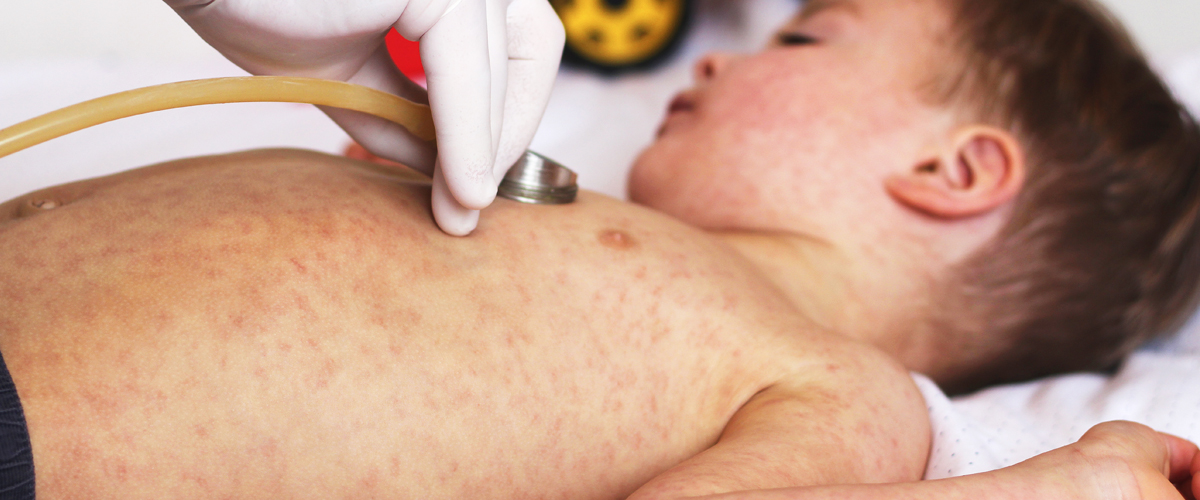Measles: Everything You Need to Know
Epidemiologist Dr. Lisa Saiman shares important information on measles vaccinations, how to avoid getting measles, and what to do if you’ve been exposed to the virus.

The Centers for Disease Control and Prevention (CDC) has issued a health alert to providers warning of a rise in measles cases in the U.S. Recently, an outbreak of nine measles cases was confirmed in Philadelphia; a possible measles exposure was reported at Dulles International Airport and Ronald Reagan Washington National Airport; and cases have been identified in Ohio, California, and Delaware. Health officials are recommending anyone who has been exposed to someone with measles to quarantine themselves by staying at home and staying away from others. They are also urging people who have not received 2 doses, to get their measles, mumps, and rubella (MMR) vaccine.
“Measles is one of the most infectious viruses that exists,” says Dr. Lisa Saiman, a hospital epidemiologist at NewYork-Presbyterian Morgan Stanley Children’s Hospital and a professor of pediatrics at Columbia University Vagelos College of Physicians and Surgeons. “If you had 10 unvaccinated people in a room and a person walked into that room with measles, nine of them would get measles.”
Vaccination is the best way to protect yourself, your loved ones, and others from getting measles, says Dr. Saiman. The vast majority of measles cases in the U.S. occur in people who are not vaccinated, according to the Centers for Disease Control and Prevention.
Dr. Saiman spoke to Health Matters about how serious measles can be, what to do if you think you or a loved one has been exposed to measles, and how you can help keep measles from spreading to others.
Who is most susceptible to measles?
Unvaccinated individuals, babies under the age of 1 who are too young to get vaccinated, and immunocompromised people who have a weakened immune system are most at risk for getting measles. Immunocompromised can mean people who cannot be immunized because of an underlying medical condition, or people who were vaccinated but lost their immunity due to a condition like HIV.
We also worry about unimmunized pregnant individuals who, if infected, are at increased risk of miscarriage or preterm labor or preterm birth.
How does measles spread?
Measles spreads through the air when an infected person coughs or sneezes. Measles has a nasty trick — it’s a very, very small particle that can remain suspended in the air upward of two hours after an infected person leaves the area.
What are the symptoms of the measles?
Measles starts as an infection inside the lungs and then moves throughout the body. The first symptoms are a fever that can get quite high, 103 to 105 degrees, a cough, a runny nose, and red, watery eyes. After having those symptoms for two to four days, a rash occurs that typically starts at the hairline, spreads over the face, then over the rest of the body. People are infectious four days before the rash appears and four days after the rash appears.
If someone suspects they or their child has measles, what should they do?
If you or a family member has measles symptoms and you know there was an exposure to measles, call your doctor’s office immediately and tell them what happened. It’s important to call first because there could be little babies in the waiting room who have not yet been immunized. If you choose to go to an urgent care center or emergency room, call first so arrangements can be made to appropriately isolate you or a family member and protect others from being exposed.
What are the potential complications of measles?
Some people think that all that happens with measles is that you get some spots and a little bit of a runny nose, but it’s not that way for everyone. There can be very serious health complications from measles. Pneumonia is a severe complication that occurs in about 1 in 20 children with measles. Diarrhea can occur in about 1 in 10 people with measles and can lead to significant dehydration. Also, ear infections can occur 1 in 10 people and lead to permanent hearing loss. Less commonly, measles can cause a brain infection and inflammation in about 1 in 1,000 people, which can lead to permanent brain damage. Non-immune young children less than 5 years old, non-immune adults older than age 20, non-immune pregnant women, and immunocompromised people who get measles are at increased risk of these complications.
How is measles treated?
There are no antivirals or antibiotics for measles. Many people who get measles won’t need to see a doctor. They will be able to stay home and take Tylenol for the fever, use something to soothe their throat, and drink fluids to make sure they don’t get dehydrated. Some people will have serious complications and need to be hospitalized to receive supportive care, including oxygen and machines to help with difficulty breathing from pneumonia or intravenous fluids to treat dehydration from diarrhea. Severe measles in hospitalized children should be treated with Vitamin A.
Can people die from measles?
The CDC estimates that one to three of every 1,000 children who get measles will die from pneumonia or neurologic complications. Pneumonia is the number-one cause of death in children with measles. Measles can also hide in the brain and can cause a very rare, but deadly, form of brain infection that occurs seven to 10 years later and leads to seizures and a complete loss of mental and physical capacity. This complication is fatal.
We mostly hear about children when there are reports of outbreaks. What about adults?
Adults who are unvaccinated or didn’t get measles as a kid are just as likely to get measles as children who are unvaccinated. But measles often spreads among children because it’s more likely that children have not been vaccinated. This may be because adults today were likely vaccinated when they were younger but are now choosing not to vaccinate their own children.

Dr. Lisa Saiman
Is the vaccine safe and effective?
The measles vaccine is very, very safe and very, very effective. The measles virus is the exact same virus that has always infected people. Measles virus is not like the flu, for which we have to get a vaccine every year because the virus keeps changing. If someone gets two doses of the measles vaccine, that person will be 97% protected. Thus, measles immunity is lifelong after you’ve received two doses of the vaccine. Note that the measles vaccine is given with the mumps and rubella vaccine (MMR) or with mumps, rubella, and varicella (chickenpox) vaccine (MMRV).
When should people get vaccinated?
The first dose of the vaccine is usually given at 12–15 months old, and the second dose between 4 and 6 years of age.
What can I do if I was born before the measles vaccine was introduced, or if the recommendation when I was born was only one dose?
Adults born before 1957 can be considered to be immune because nearly all children got measles by the time they were 15 years old before the vaccine was introduced in 1963. Adults born in 1957 or later without documentation of having received their measles vaccine should receive at least one dose of the vaccine.
Adults vaccinated between 1963 and 1967 may have received the killed measles vaccine, which was less effective. They should talk with their doctor about getting revaccinated with the current live measles vaccine.
Some adults who are in a setting with a high risk for measles transmission should make sure to have two doses of measles vaccine. These include college students, healthcare personnel, international travelers, and those who public health authorities determine are at increased risk for getting measles during a measles outbreak.
If I’m not sure whether I’ve been vaccinated, should I get vaccinated again?
There are two things that can be done. One is you could get one or two doses of the measles vaccine. The other is a blood test called measles IgG. It measures the antibody produced by your body to measles that is considered protective against measles. So if you are measles IgG positive, it means you are protected and immune.
Is there any harm in getting a vaccine if I don’t need one?
No. If somebody had two doses as a child and then gets another dose as an adult, that’s safe. There is no harm in that.
Have most health workers seen a case of measles? How is this being addressed so that they recognize the symptoms?
Many doctors, nurses, nurse practitioners, and physician assistants have never seen a case of measles since the disease was declared eliminated in the United States in 2000. My infection prevention and control colleagues and I have given dozens of lectures about measles to various clinical groups and spoken in group huddles throughout the hospital. These educational opportunities include showing pictures of rashes and describing the symptoms and complications. During the outbreak especially, we also teach the staff to “THINK MEASLES.”
Are there concerns with international travel?
If somebody is planning international travel, they should speak to their doctor and review the measles immune status of every person in their family. Measles remains a common disease throughout the world including Europe, the Middle East, Asia and Africa. This means that you really want to make sure that everybody is vaccinated, and that even includes very young babies.
The CDC now recommends that if a baby between 6 and 11 months of age is going to travel internationally, they should receive one dose of the measles vaccine, even though we don’t usually vaccinate such young babies. People who are traveling internationally should connect with their physicians at least a month prior to their travel to make sure that everybody has had the correct vaccines.
Aside from getting vaccinated, what else can people do to avoid exposure?
The bottom-line message is to get vaccinated. It protects you, but it also creates a cocoon around people who can’t be vaccinated, thereby protecting them.
Lisa Saiman, M.D., MPH, is a professor of pediatrics at Columbia University Vagelos College of Physicians and Surgeons, a hospital epidemiologist at NewYork-Presbyterian Morgan Stanley Children’s Hospital, and a specialist in pediatric infectious diseases.

